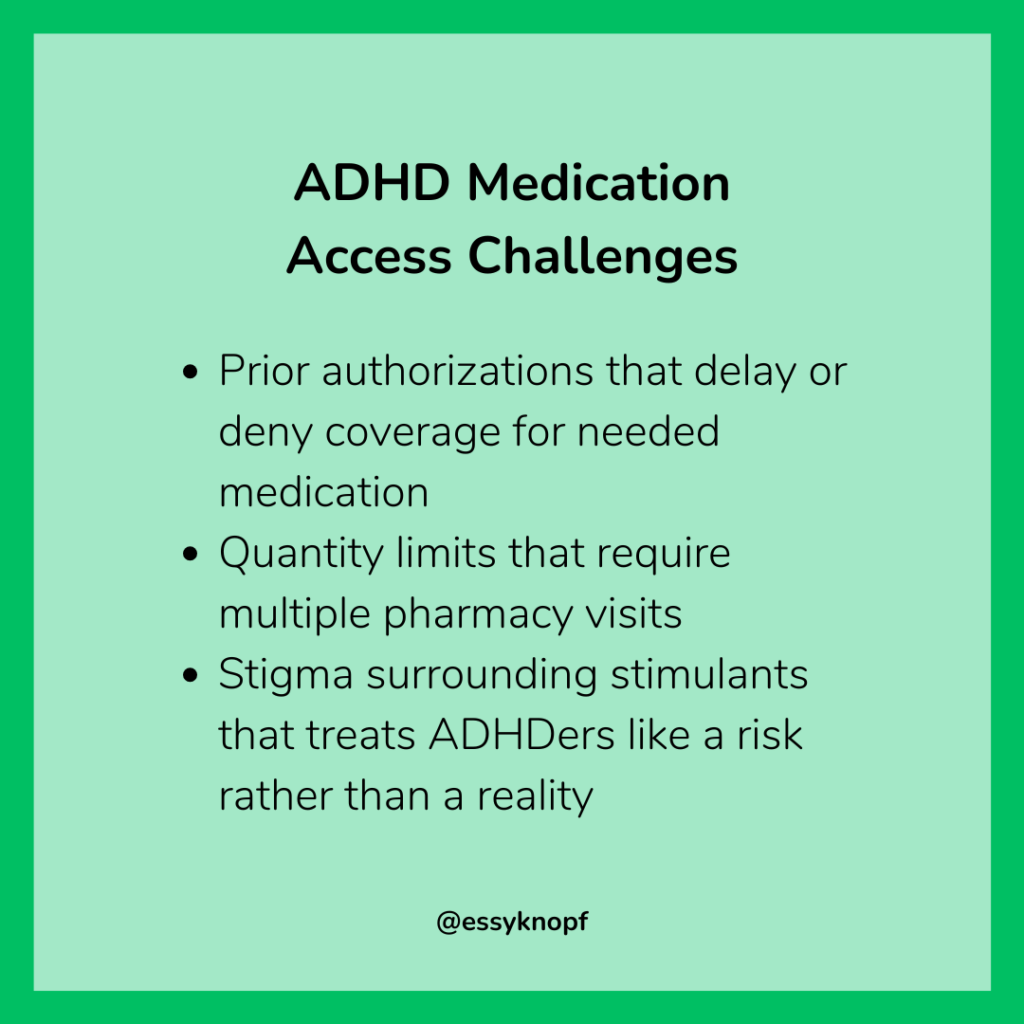We need ADHD medication parity NOW
Accessing ADHD medication isn’t just about filling a prescription—it’s a constant battle. Unlike many other mental health challenges where medications are more readily available, ADHD medication is burdened with extra hoops to jump through. These barriers disproportionately affect those who rely on stimulant medications, leaving many without the treatment they need to function.
The process is exhausting: prior authorizations, frequent refill requirements, and the stigma surrounding stimulant medications all contribute to the problem. Add to that the ongoing stimulant shortage, and what should be a simple, routine healthcare matter becomes a frustrating and even disabling ordeal.
ADHD Medication Shortages: A Crisis with No End in Sight
For several years now, the U.S. has been experiencing a shortage of medication like Adderall and Ritalin. The reasons are complex, involving manufacturing limits, increased demand, and regulatory constraints. But the outcome is simple: ADHDers are left scrambling to find their prescribed medication, often having to switch to alternatives that may not work as well or even going without entirely.
Imagine needing medication daily to function, only to be told month after month that your pharmacy is out. For many, this can lead to worsened executive dysfunction and a severe drop in quality of life.
Insurance and Prescription Barriers
Even when ADHD medication is available, insurance restrictions can create additional roadblocks. Many ADHDers must navigate:
- Prior authorizations, where doctors have to prove the necessity of ADHD medication before insurance covers it.
- Quantity limits, requiring multiple pharmacy visits for a single prescription.
- Frequent reassessments, even for adults who have had a stable diagnosis for years.
These barriers assume that ADHD medication is inherently more dangerous or prone to abuse than other mental health treatments, reinforcing stigma and making care unnecessarily difficult.
The Call for ADHD Medication Parity
Other mental health conditions do not face these same restrictions. If someone with anxiety, depression, or bipolar disorder can access their medication without excessive red tape, why should ADHDers be treated differently?
Parity means equal treatment. It means that ADHD medication should be covered and dispensed as easily as any other psychiatric medication. It means that stimulant shortages should be taken seriously as a public health issue, not dismissed as a minor inconvenience.

What Can We Do?
The fight for ADHD medication parity starts with awareness and advocacy. Here’s how we can push for change:
- Call on policymakers to enforce parity laws and remove unnecessary restrictions on ADHD medication.
- Raise awareness about the impact of ADHD medication shortages and advocate for improved pharmaceutical regulations.
- Support ADHD advocacy organizations that work to improve healthcare access for neurodivergents.
Final Thoughs
If you’ve struggled to access ADHD medication, you’re not alone. It’s time for healthcare systems to recognize ADHD as a legitimate medical challenge deserving of equal treatment. Let’s demand ADHD medication parity—because no one should have to fight this hard for basic care.

Essy Knopf is a therapist who likes to explore what it means to be neurodivergent and queer. Subscribe to get all new posts sent directly to your inbox.
© 2025 Ehsan "Essy" Knopf. Any views or opinions represented in this blog are personal and belong solely to the blog owner and do not represent those of people, institutions or organizations that the owner may or may not be associated with in professional or personal capacity, unless explicitly stated. All content found on the EssyKnopf.com website and affiliated social media accounts were created for informational purposes only and should not be treated as a substitute for the advice of qualified medical or mental health professionals. Always follow the advice of your designated provider.


